Villingen-Schwenningen
Villingen-Schwenningen (German pronunciation: [ˈfɪlɪŋən ˈʃvɛnɪŋən] ⓘ; Low Alemannic: Villinge-Schwenninge) is a city in the Schwarzwald-Baar district in southern Baden-Württemberg, Germany. It has 89,126 inhabitants (as of September 2023).[3]
Villingen-Schwenningen | |
|---|---|
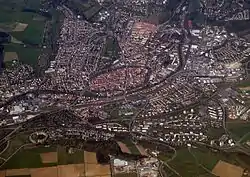 View of Villingen | |
 Coat of arms | |
Location of Villingen-Schwenningen within Schwarzwald-Baar-Kreis district 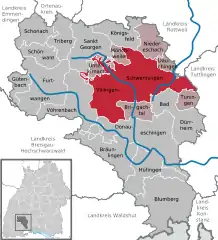 | |
 Villingen-Schwenningen 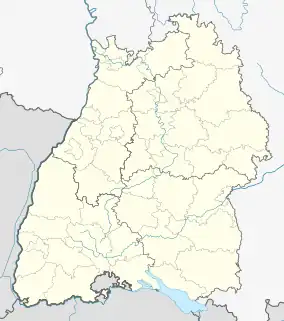 Villingen-Schwenningen | |
| Coordinates: 48°03′37″N 08°27′31″E | |
| Country | Germany |
| State | Baden-Württemberg |
| Admin. region | Freiburg |
| District | Schwarzwald-Baar-Kreis |
| Subdivisions | 2 Stadtbezirke |
| Government | |
| • Mayor (2018–26) | Jürgen Roth[1] (CDU) |
| Area | |
| • Total | 165.47 km2 (63.89 sq mi) |
| Elevation | 704 m (2,310 ft) |
| Population (2021-12-31)[2] | |
| • Total | 86,475 |
| • Density | 520/km2 (1,400/sq mi) |
| Time zone | UTC+01:00 (CET) |
| • Summer (DST) | UTC+02:00 (CEST) |
| Postal codes | 78001–78056 |
| Dialling codes | 07721, 07720, 07425, 07705 |
| Vehicle registration | VS |
| Website | www.villingen-schwenningen.de |
History
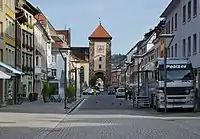
In the Middle Ages, Villingen was a town under Austrian lordship. During the Protestant Reformation it remained Catholic. Villingen came to international attention when it was besieged by Marshal of France Camille d'Hostun, duc de Tallard on 17 July 1704. Colonel Von Wilstorff put up a stout defence of the outdated fortifications, and after six days the siege failed.
Schwenningen remained a village until the 19th century. In 1858, the first watch factory was established, and watchmaking and precision mechanics have been important industries ever since. The town styled itself "the greatest watch city in the world"[4] at one time, and the Kienzle Uhren watchmaking company was founded there in 1822 and remained until moving to Hamburg in 2002. The Museum of Clockmaking celebrates the town's clock and watchmaking history.
As part of the Baden-Württemberg territorial reform of 1972, Villingen and Schwenningen were merged with a number of surrounding villages to form the city of Villingen-Schwenningen. Nevertheless, the two halves of the city are separated by a plateau and remain distinct. Villingen is a former part of Baden, while Schwenningen is a former part of Württemberg.
Villingen is a major center of German carnival celebrations. The traditional Narros represent the old citizens of Villingen: Alt Villingere, Morbili, Narro, Suribbel.
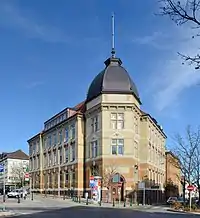
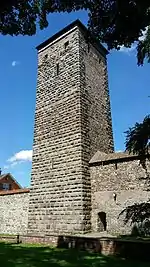
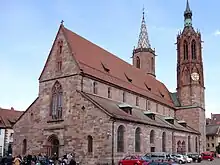
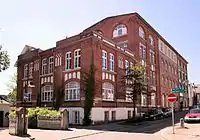
Geography
Villingen-Schwenningen lies on the eastern edge of the Black Forest about 700 m (2,300 ft) above sea level. The source of the River Neckar is in Schwenningen (Schwenninger Moos) whereas Villingen is traversed by the river Brigach which is the shorter one of the two headstreams of the Danube.
Boroughs
|
|
Mayors and Lord mayors
Villingen
- 1912–1930: Guido Lehmann
- 1931–1933: Adolf Gremmelspacher
- 1933: Gutmann, temporary
- 1933–1937: Hermann Schneider
- 1937–1940: Karl Berckmüller
- 1940–1945: Hermann Riedel
- 1945–1946: Walter Bräunlich
- 1946: Edwin Hartmann
- 1946–1950: Edwin Nägele
- 1950–1972: Severin Kern
Schwenningen
- 1797–1816: Erhard Bürk
- 1816–1819: (Vogt)
- 1819–1821: Thomas Wegler
- 1821–1825: ?
- 1825–1835: Matthias Rapp
- 1835–1841: Johann Georg Koch
- 1841–1852: Andreas Bürk
- 1852–1857: Christian Strohm
- 1857–1887: Erhard Müller
- 1887–1912: David Würth
- 1912–1925: Emil Braunagel
- 1925–1930: Ingo Lang von Langen
- 1930–1948: Otto Gönnenwein
- 1949–1962: Hans Kohler
- 1962–1972: Gerhard Gebauer
Villingen-Schwenningen
- 1972–1994: Gerhard Gebauer (SPD)
- 1994–2002: Manfred Matusza (CDU)
- 2002–2019: Rupert Kubon (SPD)
- since 2019: Jürgen Roth (CDU)
Population
Number of inhabitants
|
Business and education
Precision Motors Deutsche Minebea GmbH is a subsidiary of Minebea corporation and developing electric DC motors in Villingen-Schwenningen. Villingen-Schwenningen is the European HQ for the Japanese corporation.[5]
Villingen-Schwenningen is the home of State University for Applied Science for policing (Hochschule für Polizei Baden-Württemberg) of Baden-Württemberg Police. The University was established in 1979 and has a capacity of 1.300 students.[6]
Sights

- Town wall
- Municipal Art Gallery
- Franciscan Monastery Museum
- Schwenningen Clock Museum
- Minster of Our Lady
- Theater am Ring
- Wanne Observation Tower, one of the oldest towers built of iron
- Internationales Luftfahrt-Museum, aviation museum
Sports
Since 1904, Villingen-Schwenningen has also been home to the ice hockey team the Schwenninger Wild Wings, which competes in the Deutsche Eishockey Liga.
The town's football club is FC 08 Villingen, who in the 2021/22 season are competing in the Oberliga Baden-Württemberg[7] at the fifth tier of the German league system.
Twin towns – sister cities
Villingen-Schwenningen is twinned with:[8]
 Pontarlier, France
Pontarlier, France La Valette du Var, France
La Valette du Var, France Tula, Russia
Tula, Russia Savona, Italy
Savona, Italy Zittau, Germany
Zittau, Germany Friedrichsthal, Germany
Friedrichsthal, Germany
Notable people
- Georg Pictorius (c. 1500–1569), physician and mystic-magical author of the Renaissance
- Trudpert Neugart (1742–1825), professor of oriental languages
- Johannes Benzing (1913–2001), Turkologist and diplomat
- Martin Barner (1921–2020), mathematician
- Kurt Leichtweiss (1927–2013), mathematician
- Hartmann von der Tann (born 1943), journalist
- Horst Ludwig Meyer (1956–1999), presumed member of the Red Army Faction (RAF)
- Veit Heinichen (born 1957), writer
- Gundolf Köhler (1959–1980), right-wing extremist
- Andreas K. Engel (born 1961), brain researcher
- Markus Kemmelmeier (born 1967), social psychologist and sociologist
- Robert Prosinečki (born 1969), Croatian footballer and coach
- Michelle (born 1972), singer
- Thorsten Schmitt (born 1975), Nordic combiner
- Oliver Roggisch (born 1978), handball player
- Martin Schmitt (born 1978), ski jumper
- Andreas Lang (born 1979), curler
- Dennis Seidenberg (born 1981), ice hockey player
- Ivana Brkljačić (born 1983), Croatian hammer thrower
- Jochen Schöps (born 1983), volleyball player
- Marco Caligiuri (born 1984), German-Italian footballer
- Yannic Seidenberg (born 1984), ice hockey player
- Adem Sarı (born 1985), Turkish footballer
- Daniel Caligiuri (born 1988), German-Italian footballer
- Florian Rudy (born 1989), footballer
- Sebastian Rudy (born 1990), footballer
- Domenic Weinstein (born 1994), cyclist
- Kai Wissmann (born 1996), ice hockey player
In 2004 the former Bosnian boxer Armin „Boki“ Ćulum founded the motorcycle-like gang United Tribuns in Villingen-Schwenningen. The gang owned two bordellos and had a great influence on the prostitution scene in Villingen-Schwenningen. The gang called itself a group of bodybuilders, martial art athletes and bouncers. The United Tribuns grew fast and led to rivalry with the Hells Angels and Bandidos. United Tribuns had chapters in München, Augsburg, Nürnberg and Ingolstadt, and from 2014 also in the north in Hannover and later in Osnabrück. In Austria there was a chapter in Linz, Klagenfurt and Vienna. In September 2022 the Federal Minister for the Interior (BMI) prohibited the gang; and their money was confiscated.[9]
References
- Aktuelle Wahlergebnisse, Staatsanzeiger, accessed 14 September 2021.
- "Bevölkerung nach Nationalität und Geschlecht am 31. Dezember 2021" [Population by nationality and sex as of December 31, 2021] (CSV) (in German). Statistisches Landesamt Baden-Württemberg. June 2022.
- Villingen-Schwenningen, Stadt. "Zahlen, Daten, Fakten - Villingen-Schwenningen". www.villingen-schwenningen.de (in German). Retrieved 2022-04-08.
- "Villingen-Schwenningen - Watch Wiki: The Best Watches and Watch Brands". www.watch-wiki.net. Retrieved 14 April 2018.
- "Precision Motors Deutsche Minebea GmbH". TechnologyMountains (in German). Retrieved 2023-10-02.
- "Studienorte < Studieren in der Regio Bodensee". www.hochschulfuehrer.net. Retrieved 2023-10-02.
- "Oberliga Baden-Württemberg 2021/2022 - 1. Spieltag".
- "Partnerschaften". villingen-schwenningen.de (in German). Villingen-Schwenningen. Retrieved 2021-02-22.
- mdr.de. "Organisierte Kriminalität: Rockergruppe "United Tribuns" verboten | MDR.DE". www.mdr.de (in German). Retrieved 2022-09-14.
External links
- Official website
 (in German)
(in German) - Villingen-Schwenningen: history & pictures (in German)
- The siege of Villingen in 1702